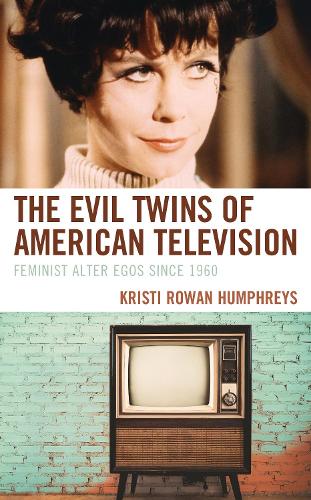
The Evil Twins of American Television: Feminist Alter Egos since 1960
(Hardback)
Available Formats
Publishing Details
The Evil Twins of American Television: Feminist Alter Egos since 1960
By (Author) Kristi Rowan Humphreys
Bloomsbury Publishing PLC
Lexington Books
22nd August 2019
United States
Classifications
Professional and Scholarly
Non Fiction
Television
Gender studies: women and girls
791.456522
Physical Properties
Hardback
138
Width 160mm, Height 229mm, Spine 15mm
386g
Description
The Evil Twins of American Television examines evil-twin depictions in over fifty years of television, comparing male twins to female twins and male-writer depictions to female-writer depictions. Kristi Rowan Humphreys studies shows such as The Patty Duke Show, Bewitched, Gilligans Island, I Dream of Jeannie, and The Brady Bunch, which use the twinning trope to explore themes like feminism and identity. Employing traits identified by Betty Friedan in The Feminine Mystique as belonging to the evil side of her schizophrenic split theory, Humphreys analyzes the ways in which these alter ego characters embody the desire for a separate self and independence through loose inhibitions, career interests, political interests, intellectual prowess, and assertiveness. The book then compares female-written twin episodes to male-written twin episodes, finding that when evil twin episodes are written or co-written by female writers, the twins are presented less as oppositional binaries and more as compatible, often symbiotic binaries, where they are still depicted as opposites, but opposites who work together and, in some cases, need each other. Thus, the female writers of these shows offer a compelling response to Friedans text, one that acknowledges and underscores the many complexities of womenthe image of which cannot in reality be so easily split into two oppositional binaries.
Reviews
In Evil Twins of American Television: Feminist Alter Egos since 1960, Kristi Rowan Humphreys meticulously intertwines her personal childhood narrative with a more complex social framework that is built upon Betty Friedan's pivotal work The Feminine Mystique. Humphreys provides an intriguing examination of traditional and not-so-traditional gender roles of popular 1960s situation comedies. Her work is not just a must-read for the nostalgic fans of 1960s television but a blueprint for gender and popular culture scholars interested in tackling the past, present, and future of the evil twin in popular television and film. -- Deborah Phillips, Muskingum University
Author Bio
Kristi Rowan Humphreys is lecturer in the Department of English at Baylor University.
